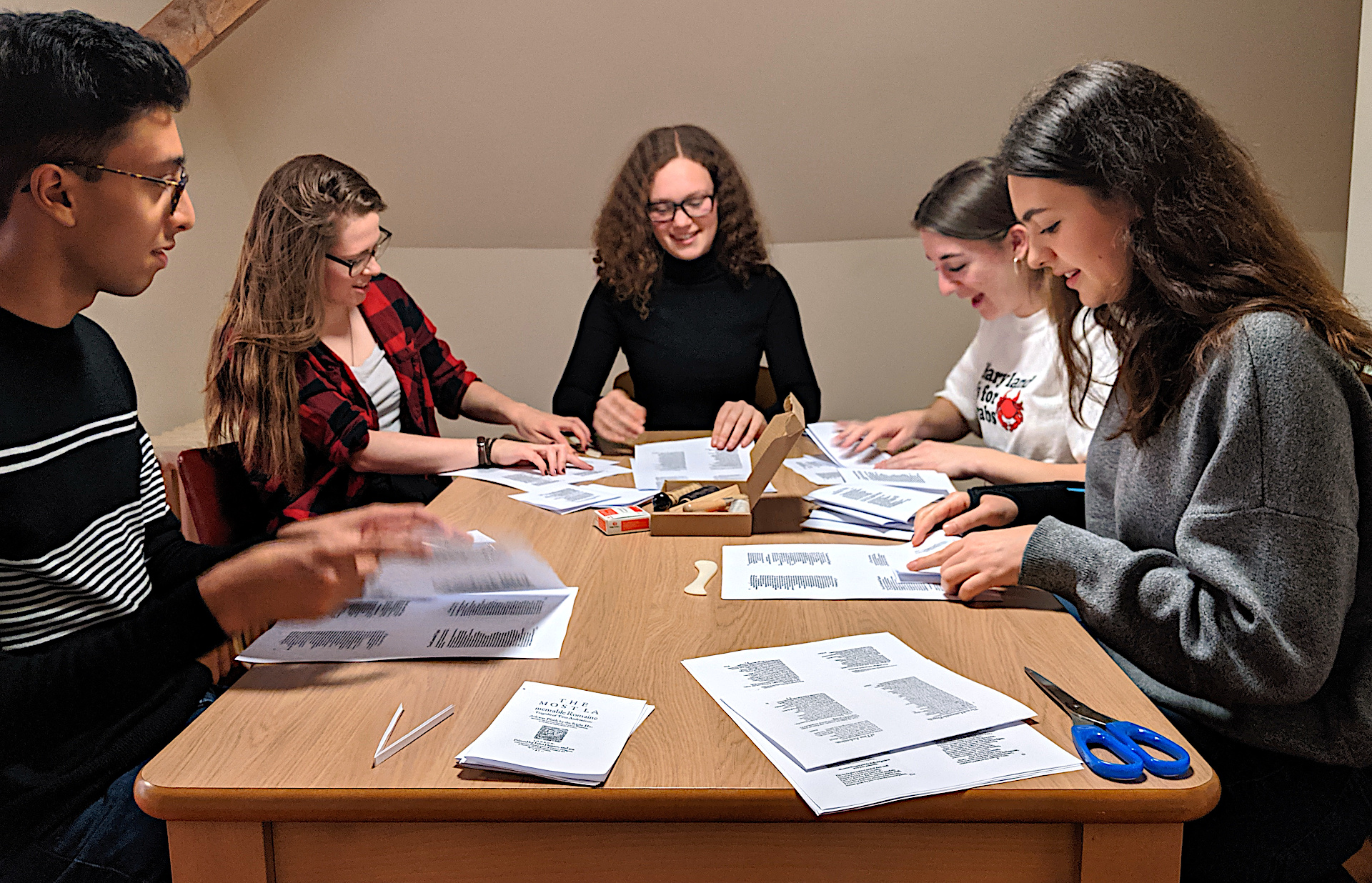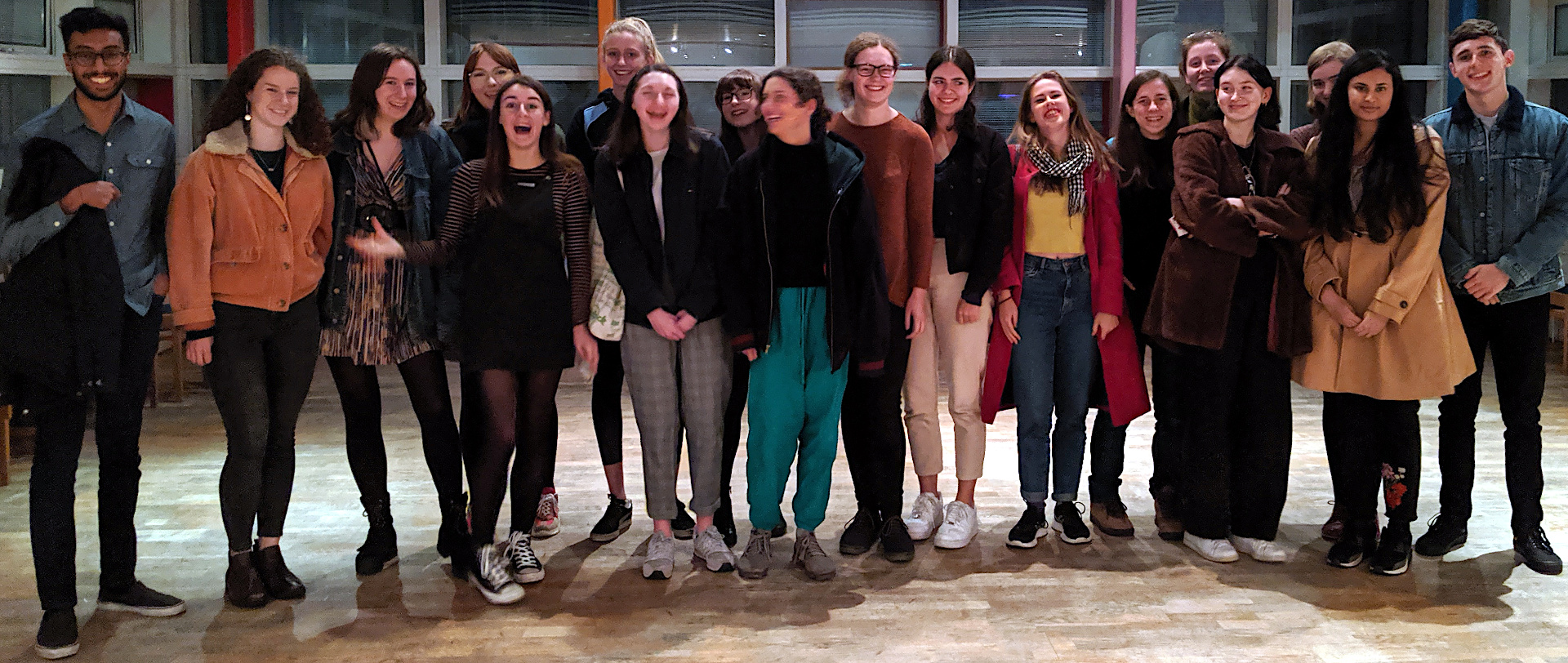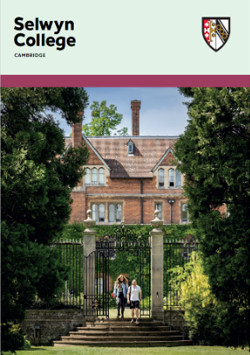We asked Dr Lotte Reinbold, one of our Directors of Studies, a few questions...
Tell us about your Tripos?
The English course at Cambridge is extraordinarily broad and wide-ranging, beginning with medieval literature, and ending with the literature of the present day. One of the key features of the Cambridge course in particular is its emphasis upon close textual analysis, known as Practical Criticism, which is taught throughout the three years of the course. The focus upon close reading encourages our students to become perceptive, attentive readers of a wide variety of texts, forms, and genres. The English course also has a strong sense of the historical sense of literature; that is, not just reading literature written in English across a broad period of time, but thinking about how ideas and literary traditions are formed and articulated over centuries.
The primary focus of the course is literature written in English. There is no taught creative writing, practical film-making, media, journalism, or drama, though many students explore these subjects through university societies.
 How is your Tripos taught?
How is your Tripos taught?
Teaching for English at Cambridge is divided between the English Faculty, and the College. The Faculty designs a very broad syllabus of papers to be studied, and provides lecture courses and some seminars and classes. The Faculty also sets and marks exams and coursework.
However, the majority of your teaching happens in college. One of the key features of Cambridge teaching is supervisions, teaching in pairs, small groups, or occasionally one-to-one. Most of your weekly teaching will happen in college, either at Selwyn with college lecturers, or with supervisors from other colleges. At Selwyn, we also teach Practical Criticism in classes, typically consisting of the whole year-group. Colleges are also responsible for admitting students and directing studies – organising your teaching, and supporting you through your course.
The prospect of attending supervisions and classes might feel daunting, but you’ll quickly learn that they are thought-provoking, enjoyable opportunities to discuss your work and your reading with your supervisor and fellow students. You’ll generally have one or two supervisions and classes a week, for which you’ll write an essay. A typical day studying English at Selwyn, therefore, might well consist of lectures at the English Faculty in the morning, and then supervisions or private study in college in the afternoon.
The papers set by the Faculty are designed to be wide-ranging and inclusive. While you have very little choice in which papers you take, particularly in your first two years of study, you have a great deal of choice over which texts you study over the course of the term. Your supervisors will guide you through the course, shaping your study and providing reading recommendations, and there’s plenty of space for you to develop and pursue your own literary interests; so, for example, you might spend a week comparing the use of language in two of Toni Morrison’s novels, while your supervision partner might be working on Morrison and Jazz music. The course combines excellent teaching and intellectual independence.
The English course at Cambridge is divided into two parts: Parts IA and IB, which cover your first two years, and then Part II, your third year. There is a new course outline for 2020, which can be broken down as follows:
Year 1 (Part IA)
In your first year, you take two compulsory papers:
- Paper 1: Practical Criticism and Critical Practice;
- Paper 2: Shakespeare. This is assessed by coursework: you’ll submit a portfolio of three short essays, around 2,000 words each, in the Easter Term of your first year.
During this year, you’ll also start work on two period papers, in preparation for your second year.
Year 2 (Part IB)
In your second year, you take four period papers, one of which can be replaced by a dissertation. It is also possible to borrow a paper from Modern Languages, Classics, or Anglo-Saxon, Norse and Celtic at Part IB.
At the end of the year, you’ll sit exams on three period papers. At Selwyn, across the two years, most students will write a portfolio on Shakespeare, a dissertation on literature 1830-1945/1870-present, and then sit exams on early modern literature, eighteenth-century literature, and practical criticism. It’s mandatory to write the portfolio on Shakespeare, and to sit the medieval and practical criticism exams, but your dissertation could, for example, be on eighteenth-century literature, or you could borrow a paper on Spanish literature in place of the early modern paper. And, of course, you’ll choose which texts to study, and what you write on – so, even though the papers might seem prescriptive, you’ll find you actually have a great deal of choice.
Third Year: Part II
The third year offers much more choice in all ways. There’s new types of subject, for example optional papers on Postcolonial and Related Literatures, Lyric, American Literature, Literature and Visual Culture (including painting, sculpture, and film), Early Modern Drama, and Material Renaissance (a course that relates literature to the material culture of the period). In your third year, you also sit a compulsory paper on Tragedy which offers an enormous choice of texts and media to study, from Greek tragedy to African literature to the television series, The Wire.
You’ll sit exams in Tragedy and Practical Criticism. You’ll also write a dissertation on your chosen topic. Beyond this, you have the choice of two optional papers, or one optional paper, and a second dissertation. The increased choice in your third year allows you to really pursue your interests, while also customising the course to your preferred way of working; whether that’s by doing more coursework and completing two dissertations, or focusing instead on taking more optional papers and sitting more exams.
Is there anything else you'd like to add about your Tripos at Selwyn?
Selwyn is a fantastic place to study English. We’re a mid-sized college, located on Grange Road, which is about a fifteen-minute walk into the centre of town. Selwyn is the closest college to the Sidgwick Site where the majority of Humanities lecturing takes place, meaning that it’s just a five-minute walk through the gardens to get to lectures. We have an excellent college library, and we’re also extremely close to both the English Faculty Library on the Sidgwick Site, and the University Library on Grange Road.
We have four College Lecturers: Professor Sarah Meer, Professor Philip Connell, Dr Lotte Reinbold, and Dr Joseph Bitney. Sarah Meer’s specialisms are race, slavery and abolition in nineteenth-century culture, especially theatre and fiction. Phil Connell works on literature, politics, and ideas from the seventeenth to the nineteenth century. Lotte Reinbold’s research looks at conventions and literary tradition in dream-writing, from the Middle Ages to the twenty-first century. Joseph Bitney is interested in classical Hollywood cinema, film criticism and theory, and modern American literature. Although our research is specialised, we all teach very broadly, and are very happy to adapt our teaching to fit in with students’ own interests. Between us, we do the majority of teaching in college, particularly in your first year, meaning that you’ll be taught by people who will teach you and work with you across all three years of your study. We tend to take between five and eight students a year, and we have a lively and friendly community of English students, including MPhil, MSt, and PhD students. We meet frequently for English events, at which we’re often joined by our colleague, Dr Jean Chothia, a specialist in drama and performance. These events range from the college’s English Dissertation Conference, to a group trip to see the Greek Play, to tea and cake to welcome our new first years. Our student-run English Society also puts on a lively programme of events for English students, including the annual English dinner.
If you apply to read English at Selwyn, we’ll ask you to take a written test as part of the admissions process. We’ll also ask you to submit some written work, which should be work that you’ve done recently at school or college, and should be marked by your teacher. If you’re called to interview, you’ll have a general interview, with one of our Admissions Tutors, and a subject interview, with two of our English College Lecturers. Before your subject interview, we might give you a piece of writing, which we’ll talk about during your interview. We might also ask you about your written application, including your submitted essays, and your personal statement. Although interviews might feel intimidating and you might be a bit nervous, we’re just interested in how you think – there’s no hidden traps or loopholes, and indeed, most people really enjoy their interviews, and find that the time flies by!
The subject at Selwyn
The Cambridge English course offers much freedom in choosing which works to study. We at Selwyn encourage students to exercise this choice from an early stage. As the course progresses, our students are increasingly involved in devising their programmes of reading; supervisors advise on matters of range and depth, and help students balance the demands of the course with their own interests and needs. The central feature of students’ work is a weekly essay, discussed in one-to-one, paired, or small-group college supervisions. The College also arranges regular Practical Criticism discussion classes.
Selwyn is very conveniently placed for English students, being situated next door to the Faculty Building, the English Faculty Library, and the University lecture block. The College Library holds over 40,000 books, including those most relevant to this subject, and stock is continually being updated.
Split Tripos: While we do sometimes admit students to read for just Part I of the Tripos, if we are convinced that the interest in English is genuine, we should point out that students who do so often end up feeling that they have missed out, since Part I English lays the foundations for the much more wide-ranging Part II, which most students find the most exhilarating part of their course. Changing into English for Part II is possible but presents problems because students have missed the full grounding given at Part I. We have had students transfer successfully but have insisted that they take an extra year over their Part II.
The Teaching Fellows
The Teaching Fellows in English are: Dr Joseph Bitney, who specialises in film studies, American literature and visual culture, Professor Philip Connell, who specialises in literary and intellectual history between 1650 and 1840; Professor Sarah Meer, who specialises in nineteenth-century literature and culture and American literature and culture; and Dr Lotte Reinbold, who specialises in medieval literature and medieval cultural history. Dr Jean Chothia is Emeritus Fellow in English and continues to play a large role in College life. She specialises in drama, dramatic language, and Shakespeare in performance.
Qualities we are looking for
University study of literature is among the more solitary courses – most of a student’s time is spent alone with books. We need to be convinced that applicants have the motivation to read intensively by themselves and organise their studies efficiently and will retain their strong interest in literature throughout the three years of the course. We therefore look for people who have decided for themselves that English is their subject and who have a genuine interest in literary language and structures, as well as the skills to excel in the course.
Subject requirements
We are happy to consider applicants taking English Language and Literature A-Level. Because the Cambridge course is almost exclusively literary in content and approach, our selection process naturally concentrates on literature. Such students may have less experience of criticising a range of literary work than candidates who offer straight English Literature A-Level, and it is therefore particularly important that they read as widely as possible to broaden their knowledge.
Admissions Assessment
Selwyn College requires applicants in English to take a written test as part of the admissions process. No pre-registration is required.
Interviews
There will be a single subject interview with two of the College’s English Fellows. It is likely that we will give you a short piece of writing to comment on during the interview.
You will also have a shorter general interview. This is intended to let us find out more about your motivation in applying for English at Cambridge. It is intended to give us a fuller sense of your aptitude for your chosen course, the maturity of your approach towards academic work, and your interests in and beyond English Literature.
Written work
We want to enable candidates to show their abilities to their best advantage. We therefore ask applicants to submit two pieces of work they have written on literary subjects which may be used as basis for discussion at the interview. Most students send us work that they have completed as part of their A-Level studies (or equivalent qualification). These should not be timed essays or pieces written specially, nor need they be the pieces for which you had the highest marks, but should be work that is lively or challenging, and that concerned novels, poems or plays that particularly interested you. This will give us a better idea of how you might respond to the challenges of an English course.
March 2025



